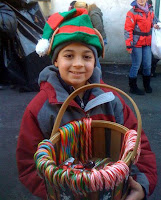
It may be the season of gifts, but have we lost the art of giving? Even during the holiday season, we swap gift cards and sweaters, stress over sizes and colors, and toss inappropriate presents aside, all with a sense of boredom and routine. We are too busy and fatigued. We are short on time. We give physically but our hearts and minds are not present. We give to satisfy our egos, to reflect our own personal wishes and desires and not entirely for the sake of the recipient.
What is true giving? True giving creates a state of peace and joy. Real gifts come from the self, not the store. As Ralph Waldo Emerson once said "Rings and jewels are not gifts, but apologies for gifts. The only true gift is a portion of thyself." Every person has gifts to offer whether kind words, a helping hand, or an expression of affection. And the truest gifts bring the greatest return, physically, emotionally, and spiritually. Giving without the expectation of return brings a sense of happiness and gratitude. The more we give, the more flows back to us.
But can we learn giving or teach it to our children? According to neuroscience professor Richard Davidson of the University of Wisconsin, who conducted a number of studies with Buddhist monks, meditating on unconditional loving-kindness and compassion actually alters our brain waves. The more we focus on generosity and compassion, the more able we are to create change. He suggests that compassion and empathy may be teachable and that we hold great potential for altering brain function by focusing on positive thought.
Teaching our children to be generous and charitable is most successful when we model giving. Let your children see the joy in selecting a special gift or donation for another, bring them with you when you volunteer your time, and show them the personal rewards of joy and happiness from the act of giving. Encourage them when they want to help or give - even if they want to give away a special toy or treat. Let them reach for their own generosity. Forced sharing or charity will foster resentment. Charles A. Smith, PhD, of the Kansas City University Cooperative Extension suggests that we honor the different ways that children express their generosity - through sharing, giving, or taking turns. Planning activities that children can do collectively can help them experience sharing on a basic level and to learn cooperative skills.
We can also work on teaching our children generosity on a daily basis and not simply during holidays or special occasions. Giving random gifts or creating special crafts or surprises out of love that is not tied to the calendar will build a strong sense of the true art of giving.
What is true giving? True giving creates a state of peace and joy. Real gifts come from the self, not the store. As Ralph Waldo Emerson once said "Rings and jewels are not gifts, but apologies for gifts. The only true gift is a portion of thyself." Every person has gifts to offer whether kind words, a helping hand, or an expression of affection. And the truest gifts bring the greatest return, physically, emotionally, and spiritually. Giving without the expectation of return brings a sense of happiness and gratitude. The more we give, the more flows back to us.
But can we learn giving or teach it to our children? According to neuroscience professor Richard Davidson of the University of Wisconsin, who conducted a number of studies with Buddhist monks, meditating on unconditional loving-kindness and compassion actually alters our brain waves. The more we focus on generosity and compassion, the more able we are to create change. He suggests that compassion and empathy may be teachable and that we hold great potential for altering brain function by focusing on positive thought.
Teaching our children to be generous and charitable is most successful when we model giving. Let your children see the joy in selecting a special gift or donation for another, bring them with you when you volunteer your time, and show them the personal rewards of joy and happiness from the act of giving. Encourage them when they want to help or give - even if they want to give away a special toy or treat. Let them reach for their own generosity. Forced sharing or charity will foster resentment. Charles A. Smith, PhD, of the Kansas City University Cooperative Extension suggests that we honor the different ways that children express their generosity - through sharing, giving, or taking turns. Planning activities that children can do collectively can help them experience sharing on a basic level and to learn cooperative skills.
We can also work on teaching our children generosity on a daily basis and not simply during holidays or special occasions. Giving random gifts or creating special crafts or surprises out of love that is not tied to the calendar will build a strong sense of the true art of giving.
As we head into the holidays, help your children embrace the joy of the season and the experience of generosity and gratitude. They will not soon forget it! Happy Holidays!

No comments:
Post a Comment
Thank you for sharing your comments with us! Please note that direct solicitations, links for marketing purposes, and other self-promotions in our comments will be removed. Thank you for your cooperation.